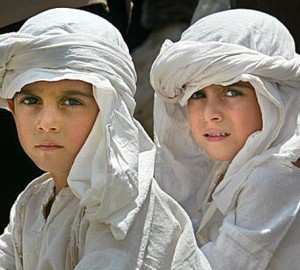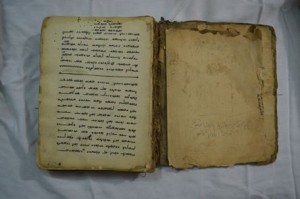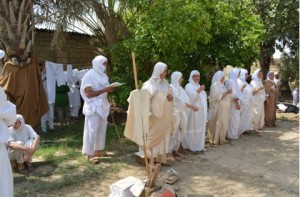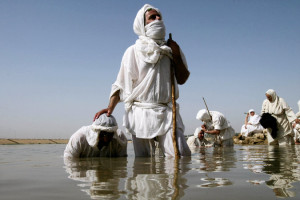Saving a culture from extinction
Yuhana Nashmi has just spent three months journeying around Iran, Iraq and Turkey recording the few remaining speakers of an ancient language, photographing crumbling manuscripts and documenting artefacts and sacred objects under threat of destruction.
Yuhana’s work is part of a unique and far-sighted program to preserve and document the fast disappearing ancient culture and traditions of the Mandaean people.

Mandaean children
In the years since Iraq’s descent into sectarian chaos the Mandaeans have become targets for both ISIS – as infidel non-believers – and also the Shia militias because of their pacifist beliefs and reluctance to take up arms against ISIS.
Caught in the middle of this bitter and interminable conflict many Mandaeans have perished; thousands more have fled their ancient homelands.
This diaspora has put at risk the very social and cultural fabric of this pre-Christian ethno-religious group whose rich language and traditions predate the Bible.
Yuhana, a Mandaean himself, says about 85 per cent of his people have now left Iraq and Iran. There are just 10 families in Melbourne but a thriving community of about 10,000 in Sydney.
There are larger communities of exiles in the US, UK, Sweden Canada although the global population numbers just 40 to 50,000.
The Mandaeans are an ethno-religious community indigenous of southern Mesopotamia, often described by scholars as “the last Gnostics from the ancient antiquity”.
The Mandaeans are among the world’s oldest, smallest and least known religious communities. They have become the unintended victims of the American invasion of Iraq and the civil war that followed in its aftermath.
As Gnostics, they have a dualistic view of life, which encompasses both good and evil and faith which is based on personal experience and pacifism.
This pacifist outlook has made them targets for other groups.
Before the 2003 US invasion, more than 50,000 Mandaeans lived in Iraq; by 2011, the population had dropped around 3,500, according to Human Rights Watch. They are now considered one of the world’s most vulnerable peoples.
Mandaeans in Iraq have been killed, kidnapped or forced to convert to Islam, says Yuhana who now lives in Melbourne and works as a case manager to asylum seekers and refugees with settlement agency AMES Australia.
“Mandaeans traditionally are very peaceful people, very learned; they traditionally work as doctors, engineers, teachers and silver and goldsmiths. In fact, the word ‘manda’ in Aramaic means knowledge,” he said.
“But the Mandaeans are heading for extinction in their traditional homelands,” Yuhana said.
“Simply, a Mandaean lives in far in nowadays Iraq,” he said.
Threatened by the militants of the Islamic State as well as by Shia paramilitary groups and local authorities, the Mandaeans, who are religiously prohibited from taking up arms to defend themselves, often felt they had nowhere to turn.
Some have received messages in the form of a single bullet in an envelope and given 24 hours to leave the country.
Thousands are languishing in refugee camps in the countries surrounding Iraq and Syria, where they live in difficult conditions.
It was these circumstances that prompted Yuhana to join a project run out of Exeter University in the UK which seeks to preserve and document endangered cultures.
“This is a three year project and we are collecting the recordings of the Mandaean language – a form of Aramaic – books, documents and artefacts to try to preserve Manadean culture and traditions,” he said.
Yuhana, who is trained in Mandaean religion and language, went to Iraq and Iran recently and visited towns and villages where Mandaeans live as a field researcher although on a tourist visa.
“Mandaean culture and language is effectively banned in Iran – you are not allowed to name your children with Mandaean names – and few people there still speak the language; so that was why I went there to record them,” he said.
“I interviewed people and priests. We recorded the details of sacred objects and photographed manuscripts and talked to people about the issues they face.
“The biggest concern is that the Mandaeans are not acknowledged in the Iranian constitution as ‘Ahl Al Kitab’ or ‘People of the Book’, which has serious consequences for them,” Yuhana said.
The aim of the project is to create an online archive that will preserve the heritage and culture of the Mandaeans. The archive, which will be publicly accessible, will store recordings, manuscripts, transcripts of interviews and photographs.
“The aim of the project is to preserve the culture, mythology and folklore of the Mandaeans,” Yuhana said.
“The purpose is, most importantly, to prevent this endangered heritage being lost, but we also hope the public will be better informed about the Mandaeans.”

Mandaean baptism
He said that Mandaean communities here in Australia and elsewhere around the world are also grappling with the problem of preserving their own unique culture.
“Mandaeans traditionally have been insular – even though you would once have found them in many towns and villages in Iraq.
“Many of the traditions are a little at odds with a western lifestyle and people usually didn’t marry outside the community.
“So discussions have begun in the community about how some of these things might change.
“The community is having a debate socially, religiously, culturally on how to redefine things. The priests are trying, and the educated people are trying, to revisit the texts and interpret things differently,” Yuhana said.
In his travels Yuhana came across what he believes is the last working Mandaean boat-builder on the Tigris River at Amarah, in southern Iraq.
“Once there were hundreds of Mandaeans building boats. It is sad they have almost all gone. But if we are going to preserve our culture and history we need to find new ways; we need to reinterpret who we are and apply our belief systems to the societies in which we now find ourselves,” he said.
“We as a people have been collectively traumatised by this chaos that has been led by some powerful people in the world! – we feel that we caught in the middle of this for no reason other than destroying everything beautiful in Iraq!” Yuhana said.
Laurie Nowell
AMES Australia Senior Journalist












